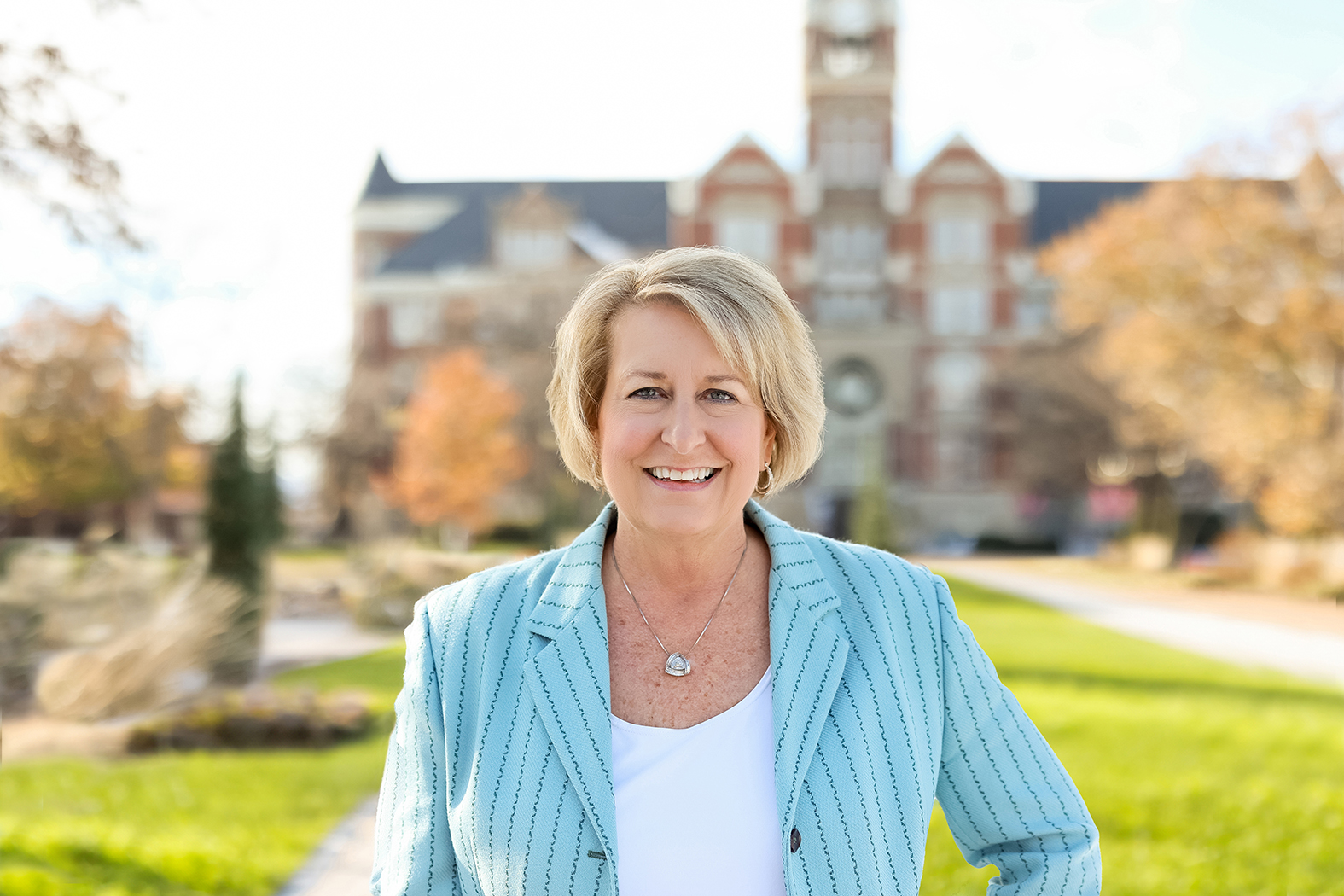As a child, Dr. Amy Bragg Carey M’98 may not have fully understood what the word philanthropy meant, or exactly what her father did as vice president of development and enrollment management at Bethel University. She just knew she loved growing up in an educational environment, with exposure to arts and athletics, various cultures, and ongoing learning.
She could have never predicted then that she would follow in his footsteps, learning what he emulated all along: that philanthropy is about building and maintaining relationships.
These relationships are some of the same things she loves most about her role as president of Friends University, a private nondenominational Christian university in Wichita, Kan. Dr. Bragg Carey was named Friends University’s 14th president — and first woman president — in 2015.
“I love interacting with the students, seeing them perform in fine arts and athletics. Engaging in their events is always a highlight,” she said. “I love to see the transformation that occurs. I think that’s special and unique at faith-based private colleges. We have very dedicated people who pour themselves into the lives of our students and you see that transformation as they first arrive … and then cross the finish line at graduation, and it’s amazing to see that. Education has that power. To be a very small part of that is very exciting for me.”
Back when she was in college, she had planned to pursue a career in communication. Instead, philanthropy and development found her — and then she found Saint Mary’s University’s master’s program in Philanthropy and Development.
“I fell into development years ago when I was out in Washington, D.C., doing an internship, and I decided I wanted to continue working there,” she said, explaining that she began working with a capital campaign consulting company and then moved to HealthEast Foundation. “I thought, ‘I really enjoy this. I should learn more about it.’ I was just doing on-the-job education at that time. I found out about Saint Mary’s program and decided to do some formal education.”
Dr. Bragg Carey found that what she was learning was immediately applicable to her job. “I wasn’t doing much in the area of planned giving, and Saint Mary’s had some excellent courses in that area,” she said. “My focus had been more on annual giving and major gifts, so learning about capital campaigns and hearing from consultants and experts was really helpful.”
She also enjoyed learning alongside a cohort of professionals with a variety of experience. “We had fun too, just being together, talking in the evenings,” she said. The group continued to connect for many years following her completion of the program in 1998.
Dr. Bragg Carey found the experience so valuable, she has recommended it to others. “Probably at least three or four people who worked for me have done the program on my recommendation,” she said. “The opportunity to hear from consultants and people who are experts in the field was really helpful. They weren’t just talking about theories and ideas, they put it into practice.”
Following her time at Saint Mary’s, Dr. Bragg Carey continued to work her way up in education, first as director for development at her alma mater, Minnehaha Academy; then as vice president of institutional advancement at Northwestern University in St. Paul from 2003 to 2015; and then her current role at Friends University.
“People would suggest to me that I should consider a college president role, and it took a while before I took that to heart,” she said. Dr. Bragg Carey studied the factors of turning around small private universities for her doctoral dissertation, and much of her work at Friends has been about building infrastructure and teams to advance the university. Naturally, she works closely with development.
“As the demographics have shifted, we have fewer donors from the older generations who trust institutions and give those dollars in a fairly unrestricted manner,” she said. “Now they’re very specific, and, in general, that’s not a bad thing, but it makes it challenging to support all of the important needs of the university. We need to raise support for those basic gifts (like ones that fund scholarships), so that’s shifted quite a bit and made it more challenging for the operating budget. I don’t see that trend shifting back, so we’ll have to be creative and thoughtful as to how we resolve that and still honor our donors’ wishes. It has to be a win-win between the benefactor’s wishes and the university’s goals and vision. It’s a balance.”
She uses a particular phrase when she talks about someone who is an effective leader in advancement. “It’s someone who wears well over time,” she says, defining someone who is consistently working with donors and building long-term relationships that connect that donor to the university in meaningful ways.
“It’s someone who has the ability to not just be flashy or high energy (a big personality),” she added. “I’ve found it’s those people who are more reflective and thoughtful who wear well over time. If we’re doing it well, we’re developing these relationships for a long period of time. That’s something that I look for, and I try to ensure we are providing those meaningful connections.”
